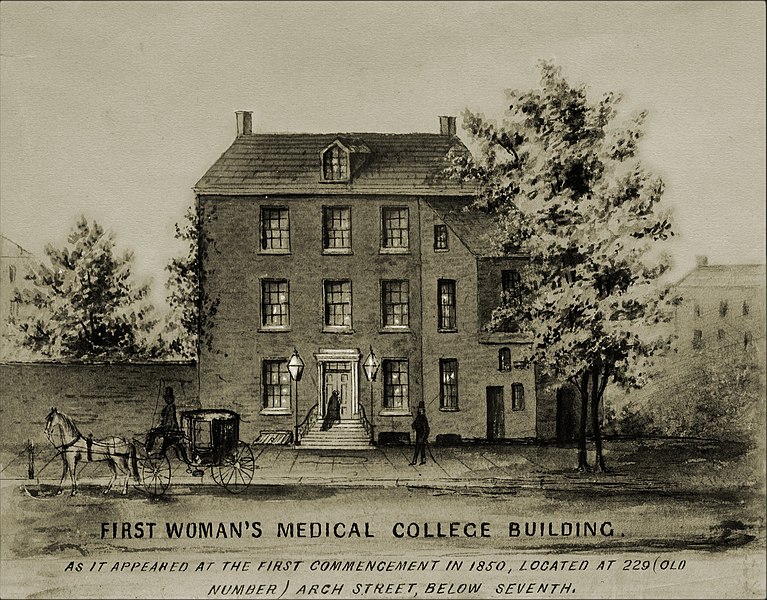Summary | Excerpt | Reading Guide | Reviews | Beyond the Book | Read-Alikes | Genres & Themes | Author Bio

A Mystery
by Ritu MukerjiThis article relates to Murder by Degrees
 Both the first hospital and the first medical school in the United States were founded in Philadelphia, Pennsylvania, landing it the nickname "City of Medicine." Therefore, it seems only natural that it also became home to the first school in the world dedicated to providing women with a full formal education in the field, allowing them to study for a medical degree. In Ritu Mukerji's Murder by Degrees, protagonist Lydia Weston is a professor at this school.
Both the first hospital and the first medical school in the United States were founded in Philadelphia, Pennsylvania, landing it the nickname "City of Medicine." Therefore, it seems only natural that it also became home to the first school in the world dedicated to providing women with a full formal education in the field, allowing them to study for a medical degree. In Ritu Mukerji's Murder by Degrees, protagonist Lydia Weston is a professor at this school.
Established in 1850, it was initially named the Female Medical College of Pennsylvania but rebranded in 1867 as the Woman's Medical College of Pennsylvania (WMCP). Its founders were a group of radical Quakers who had long championed social change, including the abolition of slavery, rights for women, prison reform, and support for immigrant and homeless communities. Among them was William J. Mullen, a wealthy manufacturer who had turned to philanthropy and served as the first president of the board of directors for the college.
The inaugural class included Dr. Hannah Longshore, who became Philadelphia's first woman doctor to have a private practice, and Dr. Ann Preston. The latter continued to work closely with the school throughout her career, shaping its future significantly. In 1867, she became the first female dean of WMCP — and of any medical school in the US. This sparked a tradition of female deans at the school that ran continuously for more than 100 years. Under Dr. Preston's guidance, WMCP became known for championing the importance of clinical experience with real patients. At the time, this kind of practical training was rare even for male doctors, but Dr. Preston arranged for students to attend clinical demonstrations, and also led a push to open the Woman's Hospital of Philadelphia, which provided medical care for women, by women. The hospital served as a place for the students of WMCP to train, and it soon was known for its women surgeons, quality internships, and nurse training programs.
Despite its early success, WMCP experienced hardships. Medicine was still very much considered a man's world and opportunities for women outside of the school remained scarce. For years, WMCP was closely associated with the so-called "Jeering Episode" of 1869, when a group of Dr. Preston's students were catcalled, spat at, and assaulted by male medical students at Pennsylvania Hospital during a visit for a demonstration. Interestingly, though public favor sided largely with the women, it was not because of sympathy for their fight to study and work as doctors, but because of the "un-gentlemanly" behavior of their male counterparts. The incident became emblematic of the larger struggle of women in medicine to be treated as equals.
Throughout the years that followed, WMCP continued to lead from the front, pioneering positive change for the sector of medicine as a whole. In the 1890s, it was among the first medical schools to adopt a four-year curriculum, and graduates established a dispensary to provide free care for poor women and children.
However, with other medical schools soon opening throughout the country and previously all-male colleges beginning to admit women, WMCP faced a drop in enrollment and was plagued for decades to come by financial problems, which prompted structural and organizational shifts. In 1970, 120 years after opening its doors, the school was renamed the Medical College of Pennsylvania as it made the controversial and much-debated decision to begin accepting male students. In 1995, it merged with Hahnemann University's medical school, and the resulting institution became Drexel University College of Medicine in 2002. Though no longer existing in name, the Woman's Medical College of Pennsylvania has left a legacy that remains strong. It produced many leading female physicians who went on to practice medicine around the world, and also shaped the nature of clinical study and higher education as a whole.
The first building of Female Medical College of Pennsylvania, later the Woman's Medical College of Pennsylvania (WMCP), as it appeared in 1850, via Wikimedia Commons
Filed under Places, Cultures & Identities
![]() This "beyond the book article" relates to Murder by Degrees. It originally ran in November 2023 and has been updated for the
October 2024 paperback edition.
Go to magazine.
This "beyond the book article" relates to Murder by Degrees. It originally ran in November 2023 and has been updated for the
October 2024 paperback edition.
Go to magazine.
Your guide toexceptional books
BookBrowse seeks out and recommends the best in contemporary fiction and nonfiction—books that not only engage and entertain but also deepen our understanding of ourselves and the world around us.